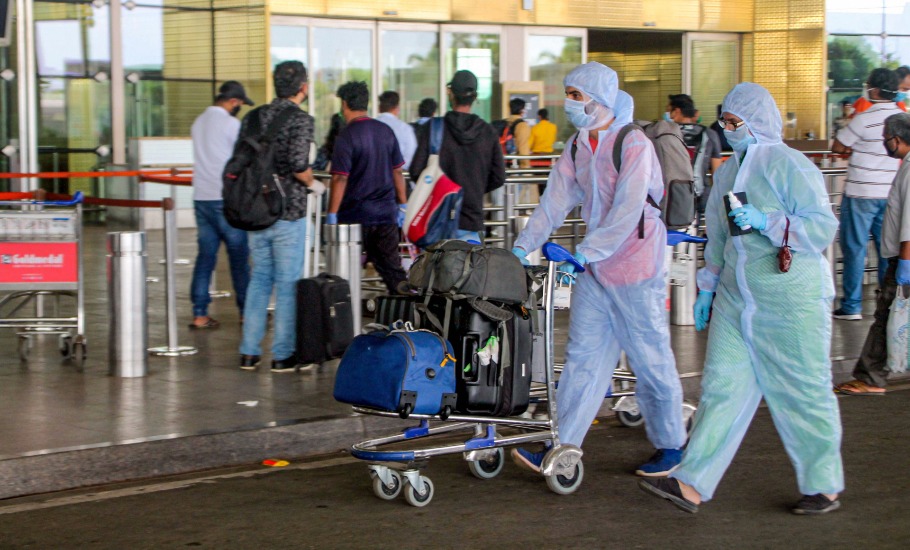
Private airports: 'No connect between hefty charges and service quality'
While mum on Adani's ownership of airports, a Parliamentary panel has asked the Aviation Ministry to address pricing anomalies at private airports

The Narendra Modi government has been laying extraordinary emphasis on inviting private sector participation in activities and projects which were, till now, largely considered the government’s domain.
Take, for example, the vaccination drive, where the private sector has been allowed to administer 25% of the doses despite gaps in procurement. In infrastructure, the management and operation of crucial airports is increasingly being handed over to the private sector; even train operations and railway station management will soon witness private sector participation.
In each of these instances, though, private sector participation is yet to bring in the promised efficiency or gains. In the case of vaccines, while 25% is allocated to the private sector its share in actual delivery is less than 10% because of price concerns.
Airport concessions are also coming under scrutiny due to the exorbitant charges the incoming private operators have begun levying. In the case of private trains and railway station management, the response of the private sector has been lukewarm at best.
Airport bidding process
In this context, the observations of a Parliamentary Standing Committee on airport concessions assume significance. The report, titled ‘Status of Aviation Connectivity in the Country’, tabled in the Rajya Sabha earlier this week, said: “There is a need to look at the entire structure of airports and the way the airport concessions are given.
“At present, the rights to operate airports are given to individuals or entities who bid the highest with the Airports Authority of India (AAI). When those services are given to the highest bidder, the highest bidder charges the highest amount of money from the airlines, which has little or no bearing on the actual cost of the service.”
The panel has asked the Ministry of Civil Aviation to “look into these issues and take urgent steps to ensure that such anomalies and structural problems are rectified in the interest of the aviation sector.”
Also read: Space: The new wild wild west
In 2018, the Centre had decided to award six regional airports — Thiruvananthapuram, Jaipur, Guwahati, Lucknow, Ahmedabad and Mangaluru — in the PPP (public private partnership) mode to private parties. In a departure from the earlier PPP model, the sole winning criterion was per-passenger revenue share. There was another difference, too: unlike earlier PPP exercises, the government decided not to cap the number of airports a single bidder could get.
Emergence of Adani in airports sector
When the bids were opened, it emerged that the Adani Group had offered maximum per-passenger revenue share for all the six airports. The group offered more than double the per-passenger fee proposed by another private airport operator for the Thiruvananthapuram airport, besides also beating the Kerala government’s offer by nearly 19%.
In the Mangaluru airport bid, the group offered six times the offer of the lowest bidder. For Ahmedabad, the Adanis offered more than 10 times the lowest bidder and so on. So, all the six regional airports went to the Adani Group.
Now, the standing committee has made no reference to these airport concessions all going to the Adani Group and has also refrained from addressing the issue of airport monopoly. This, despite the Adanis now accounting for a sizeable share of air passenger traffic across India.
Also read: What happened to India’s neighbourhood-first policy?
But, by taking up the concession modalities and pointing to airport charges levied by the private operator, the panel has indirectly referred to the Adani Group’s decision for at least one of the airports it acquired.
Debate on Lucknow airport charges
An article in Economic Times dated June 1, 2021 spoke about the new owner of Lucknow airport, the Adani Group, hiking certain charges by up to 10 times after taking it over. Subsequently, the Adani Group issued a statement saying the hike was made by a ground handling operator and has since been reversed. But the issue of exorbitant airport charges and the disconnect with the quality of service gained prominence after this incident was highlighted.
In any case, after signing the concession agreement for the six regional airports, the Adani Group also took over Mumbai International Airport Ltd (MIAL), India’s second biggest in terms of passenger footfalls.
MIAL handles more than 45 million passengers a year; the six regional airports account for nearly 10% of the country’s air traffic. So, together with MIAL, the Adanis will now handle nearly every fourth passenger at an Indian airport. This makes the group the single largest airport operator in the country after the AAI.
More plans in the pipeline
The parliamentary committee’s report mentions that the number of PPP airports will rise from just five in 2014 to 24 by 2024. At present, the AAI owns 136 airports; four are joint ventures – in Delhi, Mumbai, Chandigarh and Nagpur. It also has stakes in three more airports, namely Hyderabad (13%), Bengaluru (13%) and Kannur (7.47%).
After awarding six regional airports to a single bidder, the AAI has also approved the leasing of another six airports — Bhubaneswar, Varanasi, Amritsar, Raipur, Indore and Tiruchirappalli — under the PPP mode. It is considering clubbing each of these six airports with smaller airports nearby for joint development.

